[ad_1]
At a Japanese restaurant in a Hong Kong commercial district, the eatery’s newest dishes raised eyebrows.
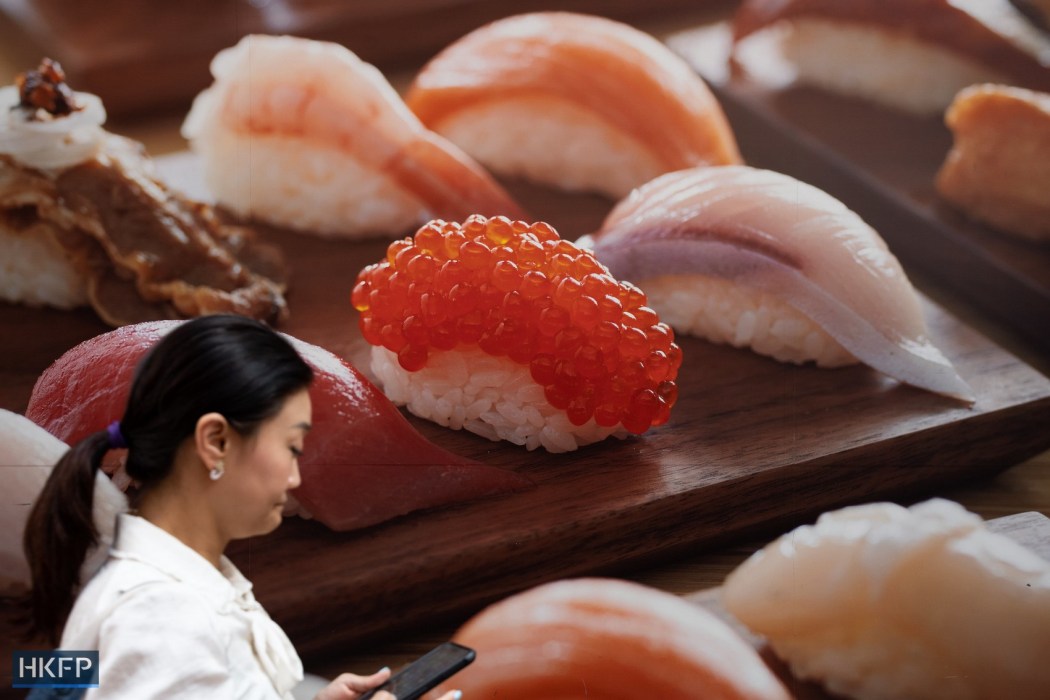
The menu advertised sashimi bowls layered with savoury blue jelly, or “radioactive water,” a tongue-in-cheek nod to recent curbs on Japanese seafood after treated wastewater from the Fukushima Daiichi nuclear power plant was released into the ocean. The dish did not, however, contain anything from Fukushima or other regions from which Hong Kong had restricted imports.
Days after HKFP visited the restaurant, it was inspected by the Food and Environmental Hygiene Department, asked whether it was using ingredients from restricted regions and ordered it to stop serving the “radioactive” bowls.
The stunt came after Hong Kong – the second-largest importer of Japanese seafood behind mainland China last year – banned aquatic products from 10 parts of Japan in late August, the same day the country began releasing the treated nuclear wastewater. Mainland China, Macau and Hong Kong are among the few places that have restricted Japanese imports. The United Nations’ nuclear watchdog said in July that Japan’s move was in line with international standards.
The blue-hued bowls – an apparent mockery of Hong Kong’s ban – was as far as the owners went in criticising the authorities. In a social media post a day before the import restrictions were enacted, the restaurant said it respected the government’s regulations.

The restaurant owner declined to speak on the record with HKFP, a reticence common among restaurant owners when asked what they think of the controls. Political experts said their hesitation reflected the reality in Hong Kong today where self-censorship is the norm – even in sectors unrelated to politics.
Developments in Hong Kong in recent years, from the disbanding of civil society groups under the national security law to overhauls of legislative and district administration electoral systems, left little room for criticism of the government, experts said.
“I think there is definitely a chilling effect in society that makes people unwilling to openly say anything that is against the government,” Liu Dongshu, an assistant professor who researches Chinese politics at the City University of Hong Kong, told HKFP.
In addition to the bans, the government has also started conducting radiological tests on all aquatic products from elsewhere in Japan, causing delays to food air-freighted from the country, restaurant owners told HKFP. Some said they had been forced to apologise to diners when ingredients were still at the airport at dinner time, forcing them to make last-minute menu changes.
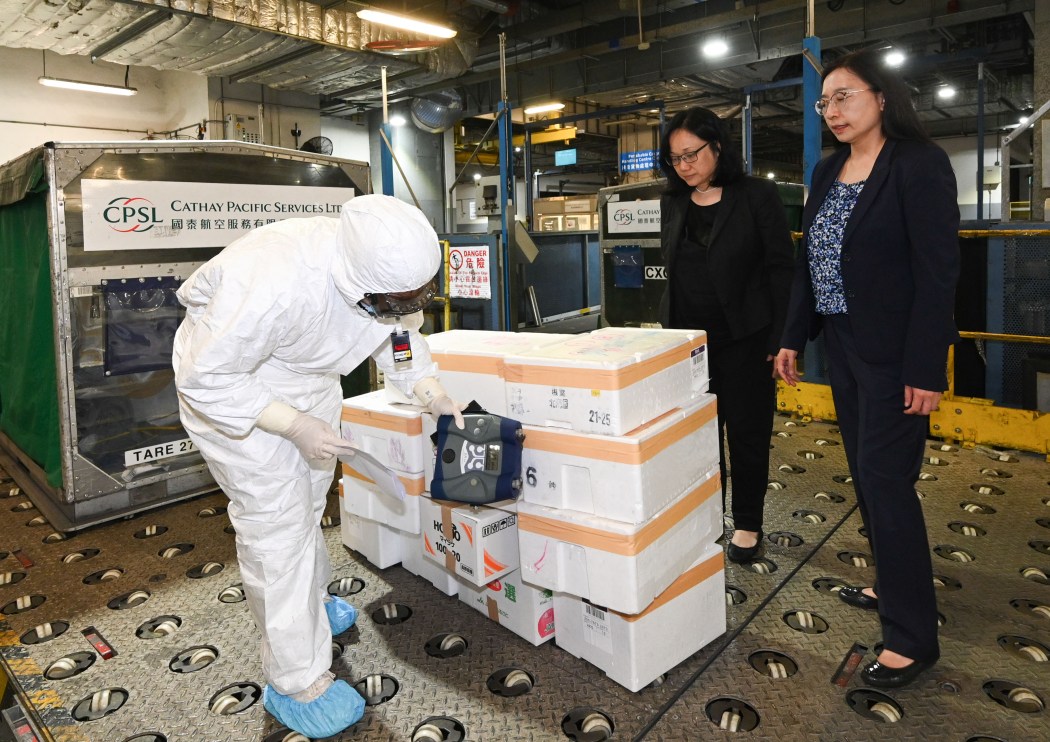
The Food and Environmental Hygiene Department told HKFP that as of September 24, all samples tested had passed the radiological tests.
Y, the director of a Japanese izakaya in the Wong Tai Sin neighbourhood, said the restrictions had brought significant inconvenience. He asked to stay anonymous as he feared reprisal from the authorities.
| 💡HKFP grants anonymity to known sources under tightly controlled, limited circumstances defined in our Ethics Code. Among the reasons senior editors may approve the use of anonymity for sources are threats to safety, job security or fears of reprisals. |
Often, diners who wanted to eat more premium sashimi would reserve in advance. But due to delays, Y said he had to tell customers their orders would not arrive in time and ask if they could come the following evening instead.
“It’s most awkward when they’re not free the next day,” Y told HKFP, speaking in Cantonese. “If we are not able to sell the order to another table, then we will make a loss.”
The government has denied that the delays were related to radiation checks, attributing it to increased imports and importers not completing the necessary paperwork.
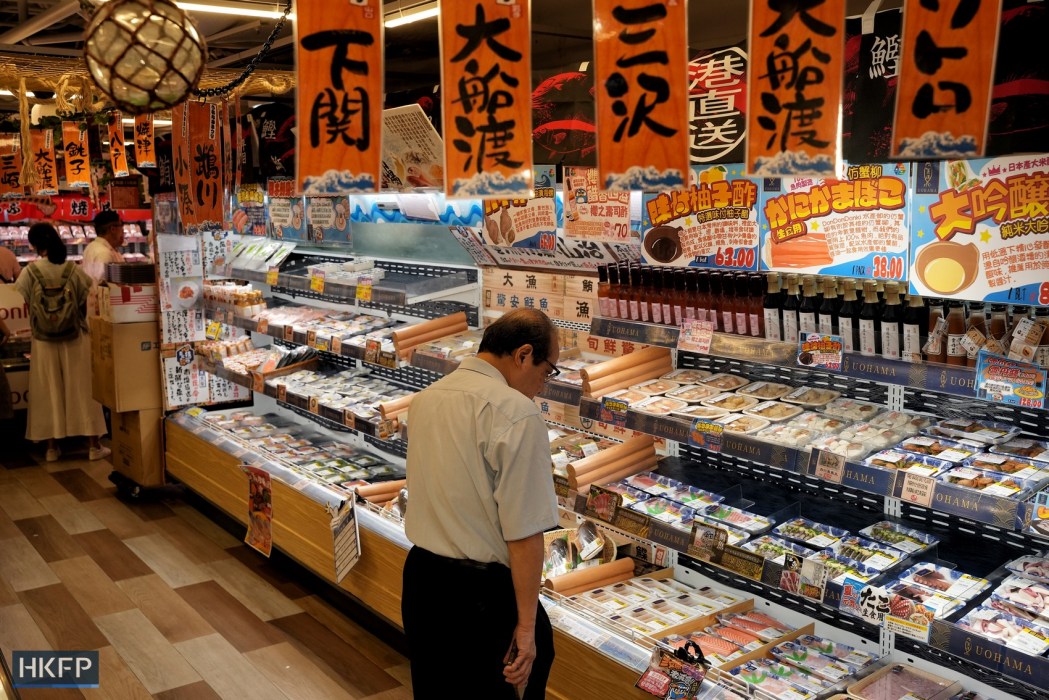
Y said that if restaurateurs spoke their mind, it could get them into trouble. He added he had read news reports of small businesses becoming victim of increased checks from government departments after being seen as critical of the authorities.
“This pressure [to stay silent] reflects that society no longer tolerates us expressing our views,” he added.
‘Loyalty’ to Beijing
There has been little international reaction to Japan’s wastewater discharge. But across the border, Beijing has banned all seafood imports from Japan and made strongly-worded remarks, rejecting Japan’s statements that the wastewater had been adequately treated.
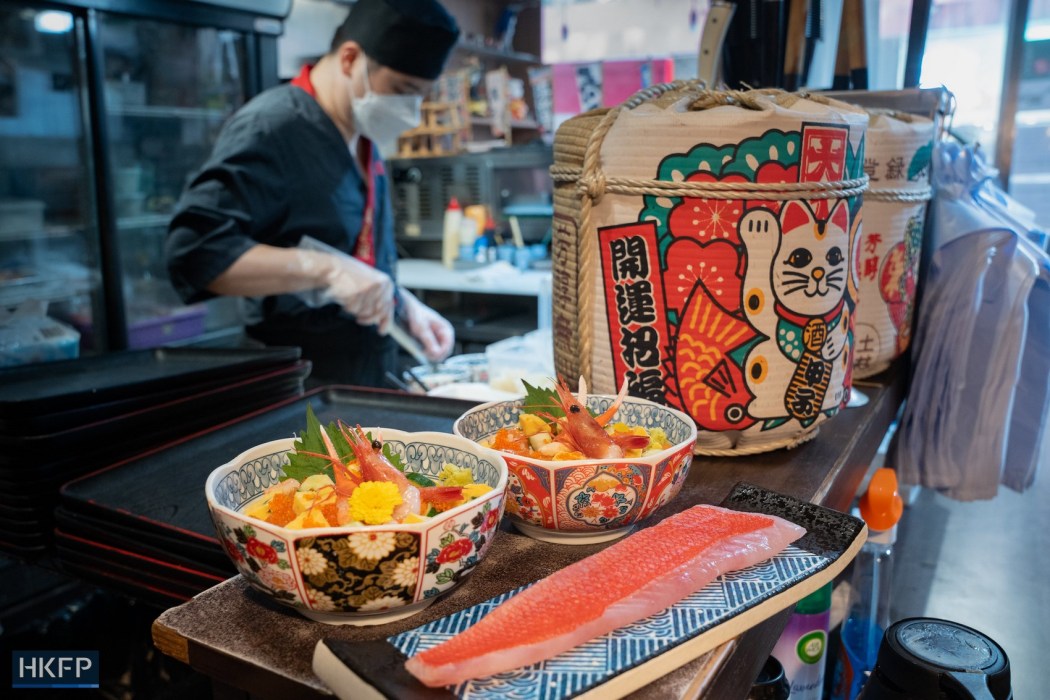
Japan was “putting its selfish interests” above people’s well-being and treating the Pacific Ocean as its own “private sewer,” China’s foreign ministry said. The hostility between the two countries dates back decades, to the Japanese invasion of China ahead of World War Two.
On Chinese social media platforms, people have called for boycotts of Japanese products, rallied behind local alternatives, and spread debunked rumours – including one about the death of a Japanese official who drank a glass of treated water from the nuclear plant at a 2011 press conference to prove the water’s safety.
The online chatter did not come out of left field. Since April 2021, when Japan first announced it would discharge the treated wastewater, Chinese state media – from national broadcasters to provincial-level platforms – have raised alarm, according to the Taiwan-based Information Operations Research Group.
Such messaging is amplified through YouTube channels, some of which came from content farms providing commentary on current affairs. They seemingly target Chinese users abroad, since the video hosting platform is blocked in the mainland.

The condemnation of Japan’s decision is less visible among the Hong Kong public, and the city has not banned Japanese seafood outright. But Hong Kong authorities have used similar language to the central government – describing the treated water as “nuclear-contaminated” – in press releases. Both governments have called Japan’s decision irresponsible, saying the discharge could impact the international community’s environment, ecology, and food safety.
Hong Kong’s restrictions include four landlocked places, raising questions about their scientific basis. Asked how the government decided to ban seafood from those regions, the Environment and Ecology Bureau did not respond directly.
“The discharge of such nuclear-contaminated water in such a large scale (130 Million cubic metres) and for such a long period (30 years) is unprecedented and there is no established international standards or practices for such discharge,” the bureau said.

The release of the treated wastewater came more than a decade after an earthquake in 2011 hit Japan’s Fukushima prefecture and damaged reactors at a nuclear plant. The country said it would discharge the water – which was used to cool the reactors – over a period of 30 years.
The water is being discharged in phases. The first was completed in mid-September, and the second phase of release began on Thursday.
Liu said that while he believed the Hong Kong government did have food safety concerns, it was “safe to say” that political factors were also at play.
“[The Hong Kong government] faces tremendous political pressure to follow the central government more closely than before the social movement,” Liu said, referring to the protests and unrest in 2019. “Hong Kong [has to show] a kind of loyalty.”
In August, lawmakers and members of the city’s largest pro-establishment groupings – the Democratic Alliance for the Betterment and Progress of Hong Kong and the Federation of Trade Unions – held separate protests outside the Japanese consulate to protest Tokyo’s decision. Representatives had organised multiple petitions up to the day of the discharge.

They also called on the government to take Beijing’s lead and ban all Japanese seafood imports, not just those from certain regions.
Tetsuro Kobayashi, a former political communications associate professor at the City University of Hong Kong who is currently at Tokyo’s Waseda University, said the parties were merely echoing the central government. Both held similar rallies when US House Speaker Nancy Pelosi visited Taiwan, a trip that China’s foreign ministry said “seriously undermined” the country’s sovereignty, he said.
“I think the rallies [against Japan] were completely a performative act,” he added. “I don’t think there’s any scientific solid ground to ban [all seafood] from Japan.”
Lawmaker Bill Tang, a member of the Hong Kong Federation of Trade Unions who demonstrated outside the consulate, told HKFP he believed a complete ban on Japanese seafood would be “best.”
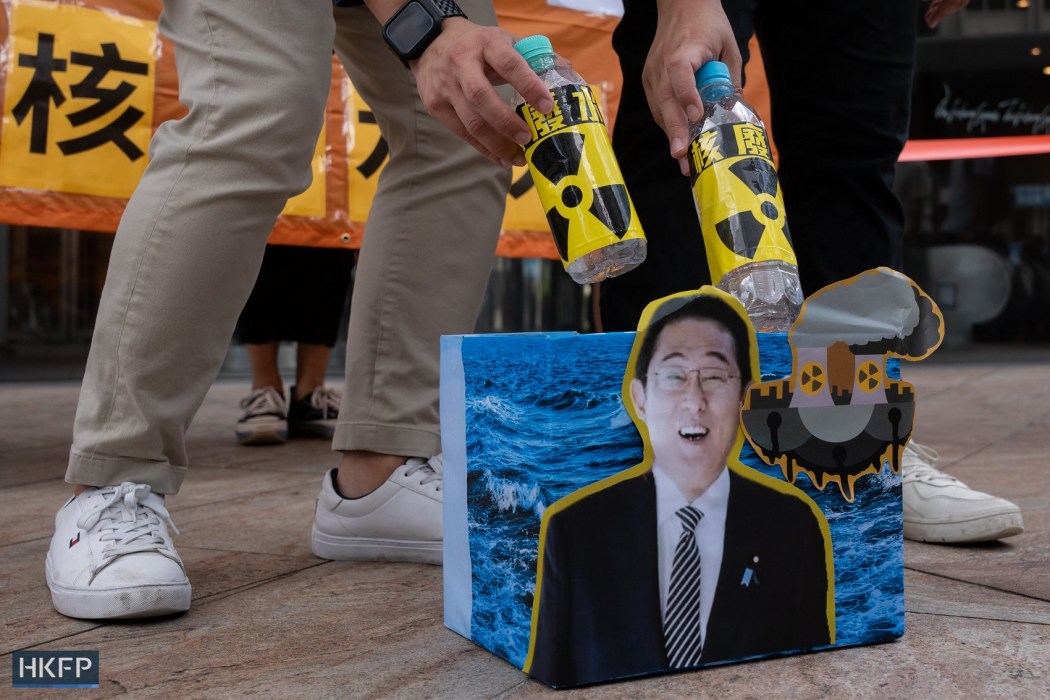
“We don’t understand how big the effect of the wastewater release would be. We need time to observe,” he said, adding that he did not think tests suggesting a negligible risk were comprehensive enough.
Asked if he thought the demonstrations were political, Tang said: “If that’s political, then I’d ask why the US government wants to ban Huawei.”
The lawmaker was referring to the US placing Huawei on a trade blacklist in 2019, meant to bar the Chinese smartphone company – which has become a symbol of the US-China tech war – from buying American software.
Tang also told HKFP he was not reducing his consumption of Japanese food. “I trust the government. If it’s passed [Hong Kong]’s radiation tests, I believe it is safe,” he said.
‘Very careful’
Restaurant owners with whom HKFP spoke said that while they saw a steep drop in diners right after the government enacted the restrictions, business had slowly been recovering.
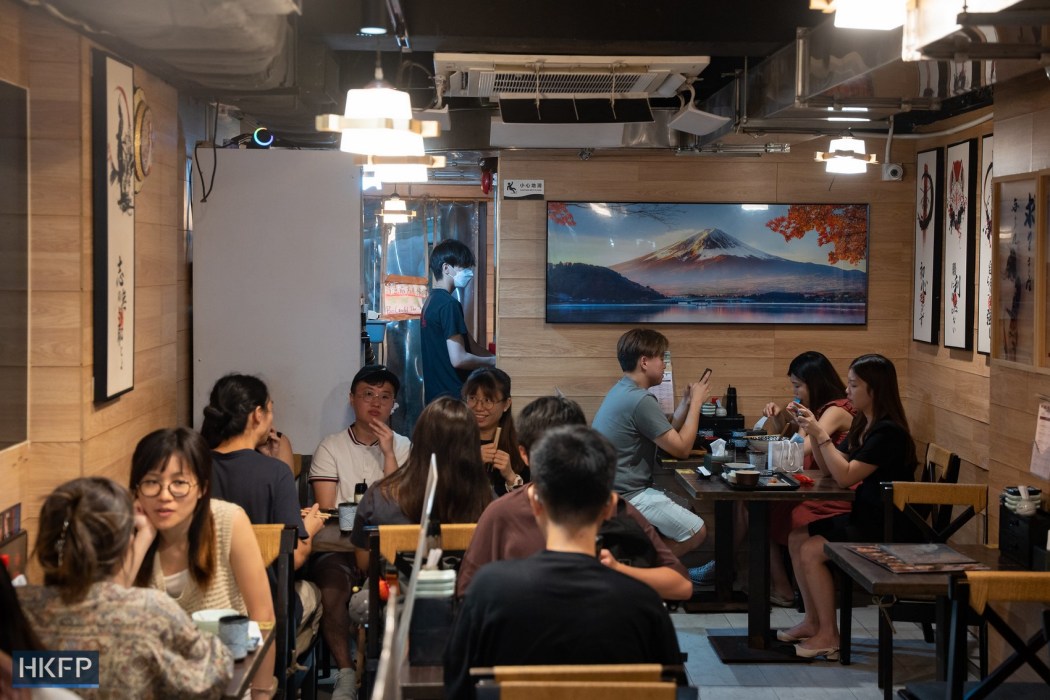
Wu Chun-wa, a manager at a sashimi restaurant in the Shek Tong Shui neighbourhood, said he did not anticipate a serious hit to revenue in the long run.
“Diners are starting to come back,” Wu told HKFP in Cantonese after a busy Friday lunch hour in September. “Japan will discharge the water for 30 years. It’s not like people won’t eat Japanese food for 30 years.”
Restaurant owners said it was difficult to gauge the impact of the ban on food supply, because they ordered seafood from middlemen suppliers in Hong Kong. The options change daily and if certain items were unavailable, it was unclear whether it was because of the restrictions or for other reasons, such as there not being a fresh catch that day.
On the whole, they said their supply was not affected much, as most of the food they imported were from regions unaffected by the ban such as Hokkaido and Kyushu.
Kobayashi said he did not think most Hongkongers agreed with the government’s reaction to the wastewater discharge.
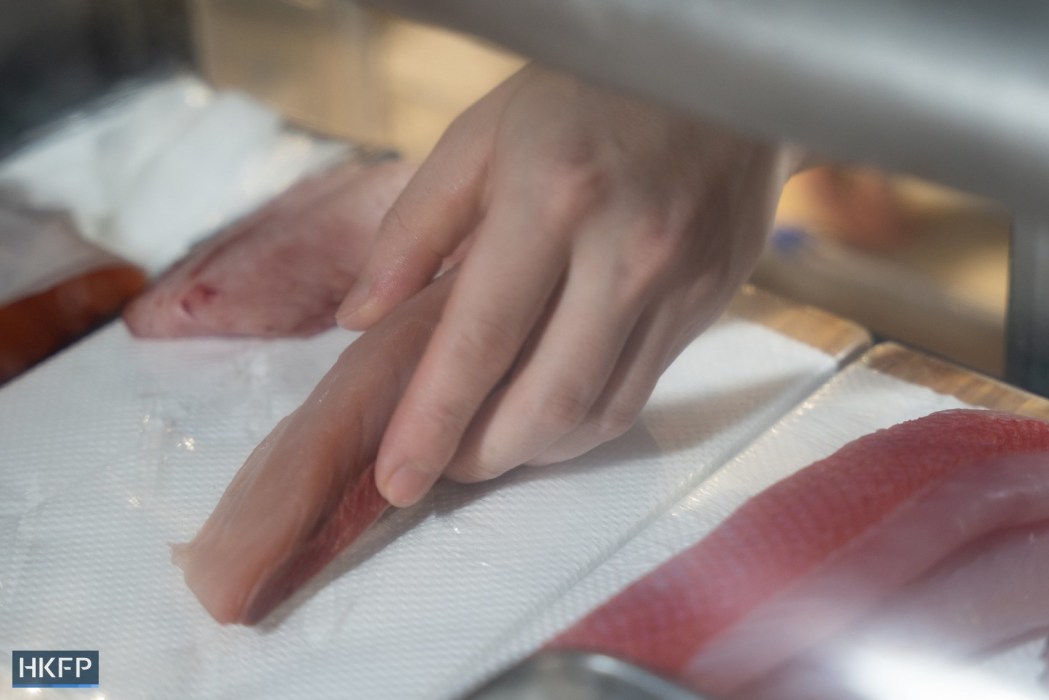
“The things that have transpired in the past three, four years in Hong Kong, people have a really good skill of discounting what the government is saying… they seek alternative information,” he said.
“It could be international media or the Japanese consulate,” Kobayashi said, referring to statements made by the Japanese consul-general that itwas “regretful” that Hong Kong authorities were referring to the treated waters as “contaminated.”
For Wu, the current restrictions were still acceptable as he could import the ingredients needed. But if the ban were to be expanded, as the pro-establishment groups had urged, Wu said his restaurant’s survival could be under threat.
“I think I’d gather with other restaurateurs and show my opposition. We’d have to make our own channels to speak out,” he said. “And we’d have to be very careful about our words.”
Support HKFP | Policies & Ethics | Error/typo? | Contact Us | Newsletter | Transparency & Annual Report | Apps
Help safeguard press freedom & keep HKFP free for all readers by supporting our team


Processing…
Success! You’re on the list.
Whoops! There was an error and we couldn’t process your subscription. Please reload the page and try again.
[ad_2]
Source link
